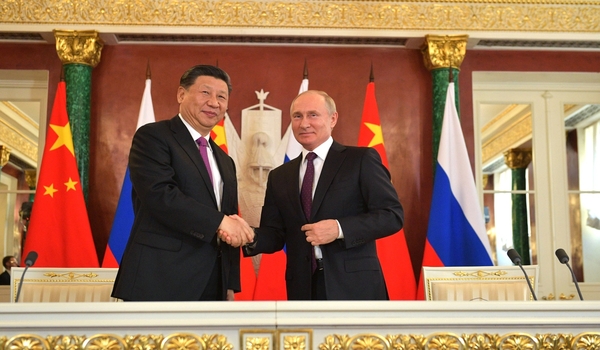The Russia-China Axis of Authoritarianism: Part I
A failure to deter Russia and China — revisionist authoritarian powers seeking to establish a post-Western global order that extols autocracy over democracy — would deal a potentially crushing blow to the post-World War II liberal international order.
The Russia-China Axis of Authoritarianism: Part I
Testing Western Resolve in Ukraine and Taiwan
Soeren Kern | Gatestone Institute | January 21, 2022
As Russia continues its troop build-up along the border with Ukraine, China has markedly increased its military activity near Taiwan. The twin geopolitical flashpoints, separated by 8,000 kilometers (5,000 miles), are raising concerns that Russia and China could coordinate or conduct concurrent military offensives that the United States and its allies may find difficult to stop.
A failure to deter Russia and China — deterrence, especially military pre-positioning near the area under threat, is the least costly way to avoid war — would deal a potentially crushing blow to the post-World War II liberal international order. That system, whose principles and norms — including adherence to the rule of law, respect for human rights and the promotion of liberal democracy, as well as preserving the sanctity of territorial sovereignty and existing boundaries — has regulated the conduct of international relations for nearly 80 years.
Analysts warn that the crisis in Ukraine, which China presumably is closely watching, may represent a turning point in world politics. An invasion of Ukraine would open the door for Russia to extend its military tentacles to countries in the Baltics and Eastern Europe. It could also embolden China to invade Taiwan, which would allow Beijing to set its sights on economic powerhouses Japan and South Korea, as well as on other regional allies of the United States.
Observers worry that Russia and China — so-called revisionist authoritarian powers seeking to establish a post-Western global order that extols autocracy over democracy — may leverage control over Ukraine and Taiwan to carve out exclusive spheres of influence in their respective parts of the globe.
If they succeed in dividing the world into zones of exclusive control, Russia and China would effectively collapse the Western global order and restore the unstable international system of great power rivalry that existed before — and ended with — the two world wars of the twentieth century.
Analysts are divided over the question of whether Russia and China ultimately will use military force to achieve their territorial ambitions, but nearly all agree that if they do, it will be because Moscow and Beijing feel emboldened by their perception that the West — led by the United States and Europe — is weaker and more divided than at any other point in recent memory.




